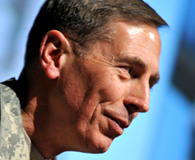Before he took over the Central Intelligence Agency last year, David Petraeus was arguably the biggest military hero in the United States. So who are his heroes? What are the touchstones of his leadership? A new biography of Petraeus—All In: The Education of General David Petraeus (Penguin), by his friend and adviser Paula Broadwell (with journalist Vernon Loeb)—points to a few.
Ulysses S. Grant
Petraeus likes to talk of how the Union general reacted to the 1862 Battle of Shiloh’s first day of fighting, which saw heavy Northern losses. “We’ve had the devil’s own day, haven’t we?” William T. Sherman said to Grant, who replied, “Yep. Lick ’em tomorrow, though.”
Lawrence of Arabia
Petraeus handles the media well and appreciates their power—as did British icon T. E. Lawrence when he led the Arabs in World War I. The general quotes Lawrence: “The printing press is the greatest weapon in the armory of the modern commander.”
Marcel Bigeard
As a young officer, Petraeus read and was greatly influenced by The Centurions, an early 1960s Jean Lartéguy novel about a French lieutenant general fighting insurgents. The book was inspired by Bigeard, the French commander famous for his anti-guerrilla campaigns in Vietnam and Algeria.
Petraeus wrote to Bigeard, and the two kept up a correspondence until the French officer died in 2010, just after Petraeus took command in Afghanistan.
William A. Knowlton
A combat veteran of World War II and Vietnam, Knowlton was superintendent of West Point when Petraeus attended in the early 1970s and was his “military father,” according to Knowlton’s wife, Peggy. He also became the future general’s father-in-law—Petraeus married Knowlton’s daughter, Holly, just after he graduated.
Frederic Remington
The Western artist’s painting The Stampede by Lightning accompanies the general everywhere, according to Broadwell. It depicts a rider galloping over rough terrain in a violent storm and trying to steer cattle to safety. Petraeus used the painting in Iraq and Afghanistan to illustrate the chaos and danger his men would face, and told them: “We need to do more than simply hang on to the saddle. We must master our mount and flourish.”





